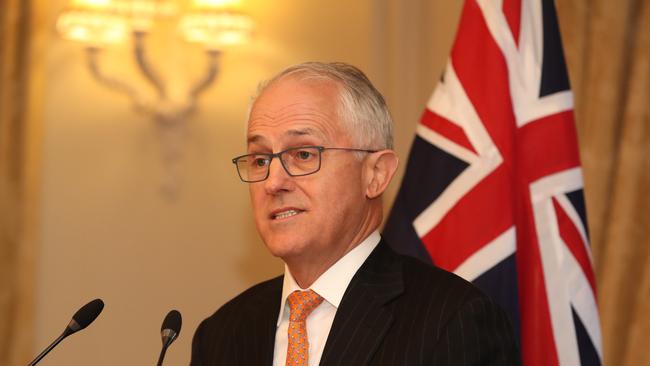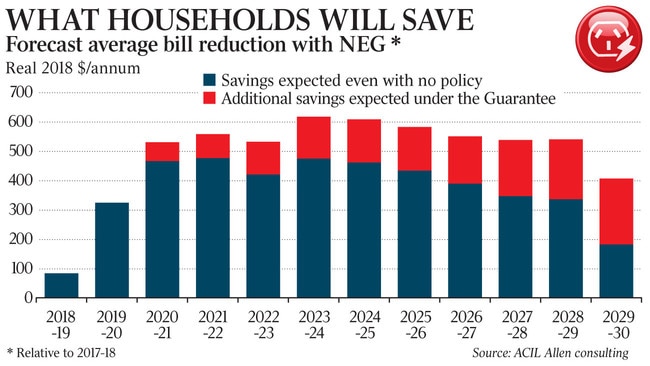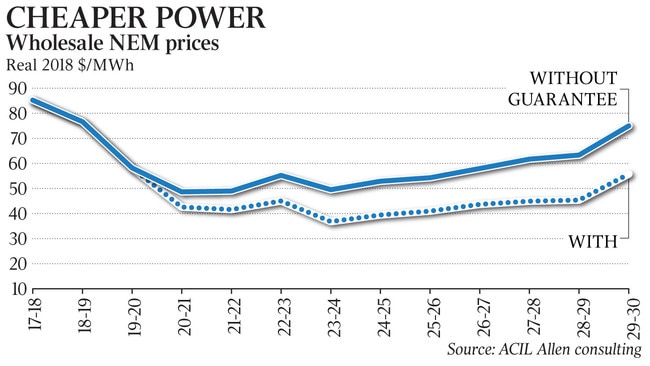Power price warning issued to Labor states
Labor states have been warned that they will deny consumers lower power prices if they fail to support the national energy guarantee.

Wavering Labor states have been warned that they will deny consumers lower power prices and spark a collapse in green energy investment if they fail to support Malcolm Turnbull’s signature electricity reform, in a final pitch to break the nation’s energy policy deadlock.
The national energy guarantee decision paper, delivered to the states this week, promises higher than expected household electricity savings of $550 a year and assures Labor that the NEG design would be compatible with higher carbon-emissions abatement targets.
The Energy Security Board’s final report sets the scene for a political battle on energy if the plan is blocked, warning that an impasse would not only harm consumers but would greatly set back green energy initiatives.
The document includes modelling that forecasts households would save $550 a year on electricity bills over a decade, including $150 a year directly from the NEG, and the remainder due to renewable investments already in the pipeline. Previous forecasts put the annual saving at $400, including $120 from the NEG.
The updated modelling predicts continued connection of renewable generation projects would plunge by 2020-21 in the absence of the NEG, due to extended policy uncertainty.
“In this environment, it is reasonable to assume that only those projects currently financially committed would proceed to build,” the document warns.
It forecasts wholesale power prices would be 20 per cent lower over the 2020s under the NEG than without it, but prices would rise in 2022-23 — with or without it — due to the closure of AGL’s Liddell power station in NSW.
Labor governments in Victoria, Queensland and the ACT have been critical of what they see as a lack of ambition under the NEG to reduce carbon emissions. The ESB recommends COAG energy ministers sign the document at their meeting on August 10, declaring that agreeing to the policy would not amount to an endorsement of the federal government’s 26 per cent emissions cut.
“The electricity emissions-reduction target, trajectory and its subsequent review is the responsibility of the Australian government. The Australian government is also responsible for whether external offsets may be used, and whether EITE (emissions-intensive trade-exposed) load is exempt,” the ESB says.

“Support by the energy council for the detailed design of the guarantee mechanism, as summarised in this paper, does not constitute approval, agreement or endorsement of the elements of the emissions reduction requirement that are the responsibility of the Australian government.”
Under the revised blueprint, retailers that fail to ensure reliability of power supplies would face civil penalties of up to $100 million — up from $10m — bringing the figure into line with that for breaches of emissions rules. The document confirms a major concession for big energy users, revealed by The Australian last week, that they will not be forced to guarantee the reliability of power supplies during forecast shortfalls, but can opt in to such an arrangement if they believe it is beneficial. It also confirms the NEG will not limit the ability of states or territories to set emissions or renewable energy targets, and that it could “automatically accommodate” higher national emissions reductions targets. It resists pressure from generation and retail giants to eliminate pro-market rules that will force big players to buy and sell contracts with smaller competitors if the market operator triggers a reliability obligation. Retailers will be able to carry forward more over-achievement in emissions reduction to the following year than previously proposed, or defer a limited shortfall.
Australian Industry Group chief executive Innes Willox said the updated design struck a “sensible balance”, making a deal more likely. “They’ve satisfied the concerns from Ai Group and our members about the previous ‘opt out’ from the reliability obligation with a fairer ‘opt in’,” he said.

The nation’s biggest single-site power user, the Tomago aluminium smelter in the Hunter Valley, said it was confident its concerns had been addressed. Chief executive Matt Howell said the design would ensure energy-intensive manufacturing businesses would not have their viability threatened.
Clean Energy Council chief executive Kane Thornton said the government still needed to ramp up its proposed emissions cut, declaring the 26 per cent target would be met by the electricity sector in a few years, due to the current wave of investment under the Renewable Energy Target.



